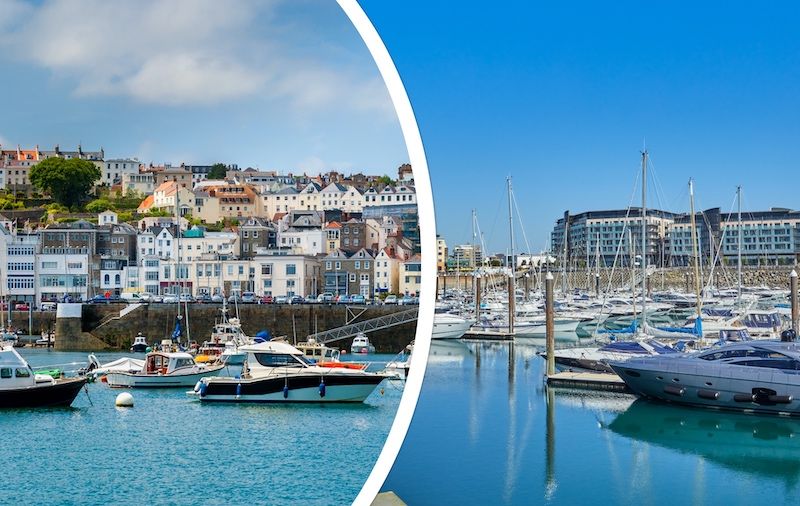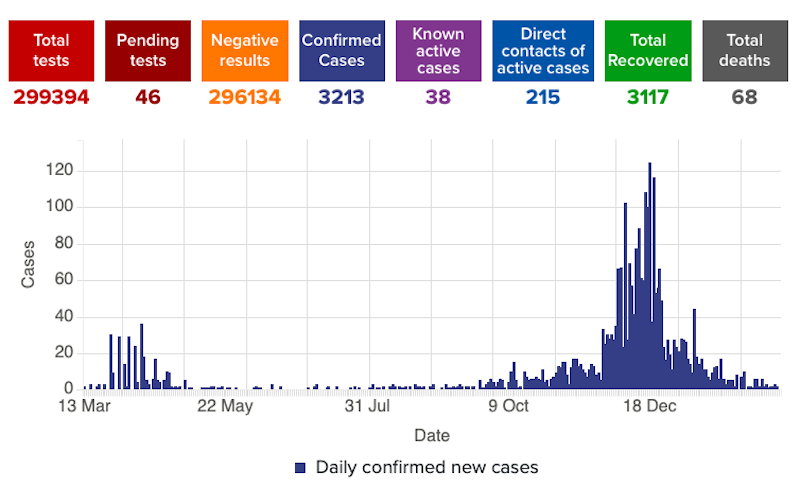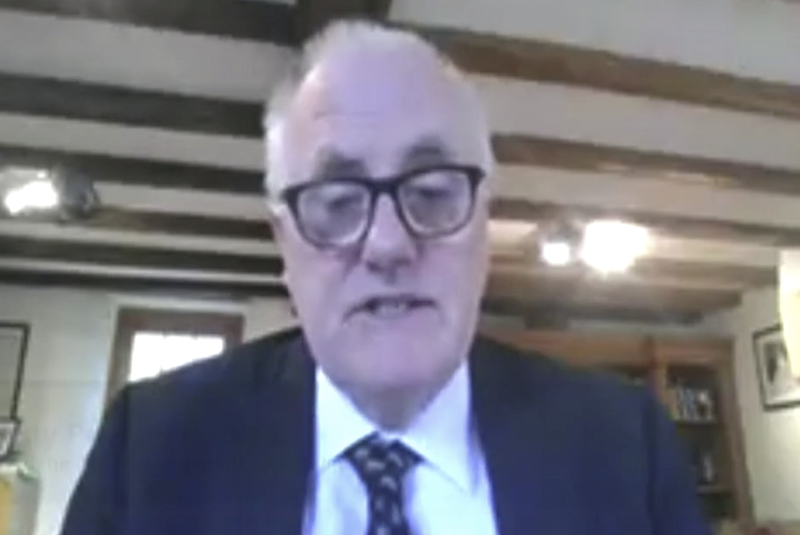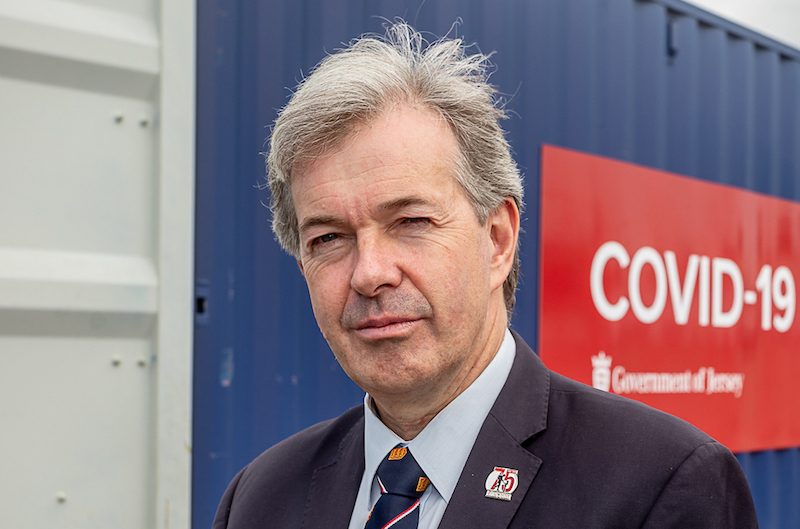


Is a travel bubble with Guernsey more likely now than at any other stage during the pandemic? Guernsey’s Chief Minister appears to think so.
Amid mounting speculation, the idea of the Channel Islands bubbling up was burst by the island’s former Chief Minister Deputy Gavin St. Pier last year.
The politician’s comments came as he enjoyed an isolation-free getaway in August in the Isle of Man, which Guernsey had instead decided to create an air corridor with, as both had pursued a close borders elimination strategy.
In an interview with Isle of Man TV, Deputy St Pier said that the Guernsey was “not even considering opening to Jersey” because he felt the two island’s strategies were “not compatible”.
It echoed the feelings of more than 2,000 Bailiwick Express Guernsey readers, who said 'no' to the move, with eight in ten survey respondents instead preferring to stick to travel within Alderney, Herm and Sark.
But much has changed since then. Both islands have gone through a second spike, and Jersey’s borders - which opened to commercial travel in July with a testing system in place to help the hospitality industry avoid suffering ‘three winters’ - are now, by default due to the rising cases in other jurisdictions and airlines’ decisions to suspend routes, shut.
Other than key workers, 14 days quarantine has been enforced for anyone coming into Guernsey since the first lockdown, irrespective of them testing negative on-arrival.
At present, the island’s border policy imposes 14 days’ self-isolation for essential travellers with tests on day 1 and day 13, and 21 days’ quarantine for those who refuse a test.
Pictured: Guernsey's former Chief Minister, Deputy Gavin St Pier, shot down the idea of an air bridge with Guernsey last year.
Meanwhile, Jersey’s Government decided in January to treat all new arrivals as having come from a ‘red zone’ - meaning a minimum of 10 days’ isolation and three tests - in response to new variants emerging around the world.
Then last week, as the recorded number of local covid patients dropped below 50, Chief Minister Senator John Le Fondré explained that, in a subtle contrast to its previous travel approach, the Government was looking to create travel corridors with jurisdictions with a low number of cases, potentially as early as Easter.
Guernsey’s Chief Minister Peter Ferbrache - who heads the island’s emergency decision-making body, the Civil Contingencies Authority - confirmed to Express last week that this is something the island’s Government would also be pursuing when in a position to do so.
Asked if the idea of a link-up with Jersey will be re-visited, Deputy Ferbrache replied: "It will indeed, as it will with the Isle of Man. It would be lovely to have a travel bubble with Jersey and/or the Isle of Man."
After six months with no community restrictions, Guernsey experienced a second outbreak and went into an immediate full lockdown on 23 January following the emergence of community seeding. Four weeks later, the outbreak is in remission and is down to around 70 cases after peaking at 366 two weeks ago.
Meanwhile, Jersey experienced its own outbreak in December, with active case numbers totalling more than 1,000 at one point. Since gaining control of that outbreak, covid-19 cases have been kept to relatively low levels, with just 38 known active cases at the time of writing.
Senator Le Fondré raised the prospect of opening the island's borders to jurisdictions with covid under "tight control", as he announced that hotels will be allowed to open for 'staycations' from today, with cafés and restaurants due to re-open at the same time.

Pictured: A well-publicised outbreak in Jersey last week, caused by home gatherings and a potential travel breach, was contained, with no positive cases on Saturday and only 46 awaiting tests.
Today is also an important day in Guernsey's recovery from covid, with the island moving to Stage 1 of its three-tiered exit strategy.
This means that households will once again be able to 'bubble' together, non-public facing businesses will be able to partially reopen, takeaways will be back on the menu and outdoor recreation time will double from two hours to four a day.
Since mid-January, all passengers arriving in Jersey have been treated as having landed from a 'red zone'. The restriction, which means that all new arrivals face at least 10 days in quarantine and must undergo three covid tests, was introduced in response to more infectious variants of covid being identified around the world.
Meanwhile, Guernsey has banned all non-essential travel for an indeterminate length of time, with islanders having to apply for an essential travel permit to come into or leave the Bailiwick. For those that do arrive or return here, 14-day self-isolation requirements with day 1 and day 13 tests await, with heavy fines for those who breach their quarantine.
Just last week, a man returning to the island from Europe was slammed with a £10,000 penalty - carrying a direct alternative of 500 days in prison - for visiting a relative at a supermarket and then popping to the pub on the day he came back to Guernsey.
After taking very different approaches last year, the Channel Islands' border restrictions now bear some pretty striking resemblances.

Pictured: Deputy Peter Ferbrache has refused to be drawn on when border restrictions might be relaxed on a wider scale, saying only that it certainly will not happen during the three stages of our exit from lockdown.
Last year, there was little appetite in Guernsey to pursue unrestricted travel with its sister Channel Island due to the diverging responses to the pandemic. Guernsey, at the time, was pursuing an elimination-style strategy, while Jersey employed a 'delay, contain, shield’ strategy that sought to limit the number and nature of cases at "low levels".
Guernsey's approach has shifted in the latest outbreak, with Public Health ruling out continued pursuit of elimination and instead aiming to "suppress" and control the presence of the virus in the island.
"What we are looking to do is suppress the virus to a level where it doesn’t impact on the health and wellbeing of the community," said Guernsey's Public Health Director Dr Nicola Brink.
"We are aiming to get down to a situation where we don’t have active community seeding and to protect the health and wellbeing of the community while we go through an immunisation programme."
The first nine priority cohorts - the last of which is over-50s - are due to be vaccinated by April, while Jersey is also following JVCI guidelines and has committed to doing likewise by the end of March before moving on to the wider population.

Pictured: Senator John Le Fondre has attracted more public scrutiny from political colleagues over his decision-making during the pandemic than his counterparts in Guernsey - first, Deputy Gavin St Pier, and now Deputy Peter Ferbrache.
While concerns have begun to emerge in Guernsey about the island experiencing a 'fourth winter' for tourism and the uncertainty of islanders' holiday plans, as well as the fact there are more similarities now between the two islands' pandemic approaches than there were last year, there have been no notable polls this year on a Guernsey-Jersey air bridge to see how far Guernsey residents' opinion has shifted.
Responses to a June 2020 Island Global Research survey, completed the month after Express's poll, found that 45% of people in Jersey who replied were in favour of a 'travel bubble' with Guernsey, compared to just 14% of Guernsey respondents.
There has been little to no political challenge in Guernsey to the Civil Contingencies Authority's decision-making. Meanwhile, Jersey's Chief Minister has repeatedly come under fire from his political colleagues, some of whom say he has "mismanaged the pandemic" and "put the island at risk". Before rising to the most senior political post, even Deputy Ferbrache made some disparaging remarks, telling the island's States Assembly that colleagues of his had described the island's Government as a a "bunch of bumbling idiots."
Since then, each island's leaders have been at pains to sidestep comparisons in their handling of the pandemic from both a public health and economic perspective. The embattled Senator Le Fondré - who survived a vote of no confidence in November - retorted last year that: “It’s only going to be in five or 10 years’ time that we will know who did better or who did worse I’d suggest.
“It’s not a competition, it’s about following the profile that’s appropriate for our island.”
While it never appeared likely last year, linking the islands may be an appropriate next step, as both islands seek a controlled re-opening of borders to carefully-selected jurisdictions.
Comments
Comments on this story express the views of the commentator only, not Bailiwick Publishing. We are unable to guarantee the accuracy of any of those comments.